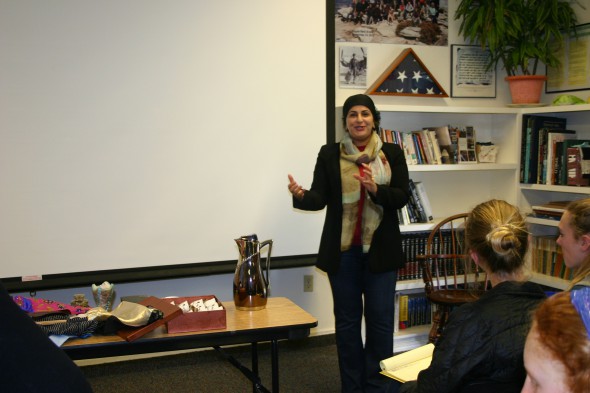Anacapa Students are Going Beyond Borders
This year’s Synthesis Unit focused on the Middle East
“This unit helped me see beyond the black-and-white stereotypes that are often portrayed by the media, and better understand the many ways different people are connected.”
-9th grade student
2014-2015 Synthesis Unit Schedule • Facebook photo album • Synthesis Unit Responses 2015
Students from Anacapa School became scholars of the Middle East recently as part of a week-long intensive study of the cultures, conflicts, and complexities of this region of the world. During the week of January 26, students and faculty heard presentations from speakers on a range of topics, including politics, geography, history, culture, and religion.
“The Synthesis Unit helped me understand and interpret events clearly,” said Aylin, a seventh-grade student at Anacapa School. “This helped me understand and sort of experience their daily life.”
Each year, Anacapa School takes one week between first and second semesters to explore a topic in depth during its annual Synthesis Unit, the school’s premier tool for developing critical thinking skills. For more than 30 years, Anacapa School has covered important topics each year, such as World War II, global climate change, and the future of space exploration. This year’s unit, Beyond Borders: Cultures and Conflicts in the Middle East, is a follow up to last year’s unit, Discovering World Religions: Exploring Life’s Big Questions.
“The Synthesis Unit is designed to be relevant, exposing students to important ongoing issues in the world,” said Gordon Sichi, Anacapa’s headmaster. “One of our goals with this unit was to give students an opportunity to understand the complexities of this region, including the history, geography, and how religion plays such an important role in the political landscape.”
Anacapa’s Synthesis Units expose students to some of the brightest minds and most talented experts in Santa Barbara and beyond. This year’s unit drew heavily on experts from UCSB, who provided a high-level overview of the region. The caliber of the presenters and the give-and-take between speakers and students provide a critical thinking experience that students do not typically experience until college.
“The Synthesis Unit really helped me to comprehend the ongoing issues in the Middle East a lot better,” remarked Rufus, a twelfth-grader. “Having a proper understanding of people, religion and custom is very important when discussing world events. Understanding the different components of the big picture is the first step to solving real world problems.”
After the Synthesis Unit presentations, students were divided into groups in order to work on a final Synthesis Unit “product.” The product this year was twofold: a research paper written individually and a group presentation. Each group researched one of the following topics:
- History, Important Events, and Turning Points
- Politics, Governments, and Current Challenges
- Religious Issues
- Arts and Architecture
- Economy and Financial Issues
- Environmental Issues
As a culmination of the unit, the groups presented their findings at an all-school assembly on April 30th.
“All students contributed and participated in the morning-long presentations,” said Suzie Sichi, one of Anacapa’s founding teachers and current head of faculty, “Each group took a unique and often entertaining approach to communicate their researched, synthetic knowledge to the student body as a whole. Arts and Architecture organized an itinerary for a tour group to visit important sites, sample the culinary arts and even hear a concert. History, Important Events and Turning Points used a television game show format to rapidly share some very important information spanning a long time period. One stand out address, which earned Senior Rufus O’Dea the Best Speaker Award, was from the Politics, Governments and Current Challenges group, who organized a news program called “A Journey East” with Anderson Cooper (a.k.a. Rufus) interviewing student experts from across the region. The performances were impressive displays of the students’ considerable familiarity with the complexities and significance of this critical area of today’s world.”

